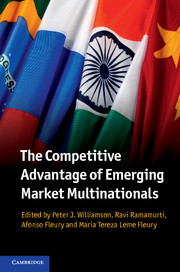Book contents
- Frontmatter
- Contents
- List of figures
- List of tables
- Notes on contributors
- Acknowledgements
- Introduction
- Part I Innovation and competitive advantage
- Commentaries on Part I
- Part II Value-chain configuration and competitive advantage
- 5 Value-chain configurations of Brazilian EMNEs
- 6 Value-chain configurations of Russian EMNEs
- 7 Value-chain configurations of Indian EMNEs
- 8 Value-chain configurations of Chinese EMNEs
- Commentaries on Part II
- Part III Mergers and acquisitions and competitive advantage
- Commentaries on Part III
- References
- Index
6 - Value-chain configurations of Russian EMNEs
Published online by Cambridge University Press: 05 April 2013
- Frontmatter
- Contents
- List of figures
- List of tables
- Notes on contributors
- Acknowledgements
- Introduction
- Part I Innovation and competitive advantage
- Commentaries on Part I
- Part II Value-chain configuration and competitive advantage
- 5 Value-chain configurations of Brazilian EMNEs
- 6 Value-chain configurations of Russian EMNEs
- 7 Value-chain configurations of Indian EMNEs
- 8 Value-chain configurations of Chinese EMNEs
- Commentaries on Part II
- Part III Mergers and acquisitions and competitive advantage
- Commentaries on Part III
- References
- Index
Summary
The dynamic growth of multinational enterprises (MNEs) from emerging economies – mostly from so-called BRIC countries (Brazil, Russia, India and China) – is widely acknowledged as one of the key developments in the global economy in the last fifteen years. Today emerging market multinational enterprises (EMNEs) account for nearly one-tenth of the foreign sales and foreign assets of the top 500 multinationals in the world, compared to only 1–2 per cent in 1995 (UNCTAD, 2010). In the 2000s, the number of companies from emerging economies in the Fortune Global 500 has more than tripled (from twenty-one to seventy-five). In the new decade, competition between multinationals from developed countries and EMNEs with global aspirations (defined by Boston Consulting Group as ‘global challengers’) will continue to intensify. This new trend in globalisation of the world economy was reflected recently in booming interest in EMNEs in international business (IB) and strategic management (SM) fields, including publication of several books on the subject (Rugman, 2005; Goldstein, 2007; Casanova, 2009; Larcon, 2009; Ramamurti and Singh, 2009a).
Most of the existing EMNEs literature is either quite descriptive or is based on rather limited arguments in the early theoretical interpretations of foreign expansion of MNEs from emerging economies. Attempts to explain the growth of foreign direct investment (FDI) and reinforcement of EMNEs’ positions with country-specific advantages (CSA) come across several difficulties. Reasoning based on CSAs could not suffice the need for our comprehensive understanding of the nature and mechanisms of EMNEs’ competitive advantages. On one hand, today (as compared to the second half of the twentieth century) FDI is no longer the only attribute of multinational activities. Cross-border value-adding non-equity arrangements are gaining at least similar strategic importance for MNEs from both developed and emerging economies.
- Type
- Chapter
- Information
- The Competitive Advantage of Emerging Market Multinationals , pp. 116 - 131Publisher: Cambridge University PressPrint publication year: 2013
- 2
- Cited by



